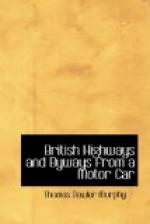A little after noon we reached our London hotel, having spent ten weeks in touring England, Wales and Scotland. We had not confined ourselves to the highways, but had journeyed a great part of the distance through less frequented country roads. In fact, many of the most charming places we had visited could be reached only from the byways and were not immediately accessible from railway stations. With the exception of the first two weeks, when we had rain more or less every day, we had been favored with exceptionally fine weather. During the last seven or eight weeks of our trip, only light showers had fallen and we were assured that the season had been an unusual one for England.
The matter of weather is not of great moment to the motorist in Great Britain. The roads are not affected in the least, so far as traveling is concerned, and dashing through the open air in a rain is not an unpleasant experience. A closed top for the car is rarely necessary. Plenty of waterproof coats and coverings answer the purpose very well and the open air is much pleasanter than being cooped up in a closed vehicle. Rubber tires do not slip on good macadam roads and during our tour it was necessary to use chains on the wheels only a few times.
Altogether, the experience was worth while; nor was it so expensive as many have imagined it to be. A party of three or four people with their own car, if one of them drives, can tour Britain for less than it would cost to cover the same ground, traveling first-class, by railway train. As to the comparative satisfaction derived from the two methods of touring, no comment whatever is needed. Making the trip by motor affords so many advantages and so many opportunities of seeing the country and of coming in touch with the people that there is really no other method that can in any way compare with it.
XX
SOME MIGHT-HAVE-BEENS




